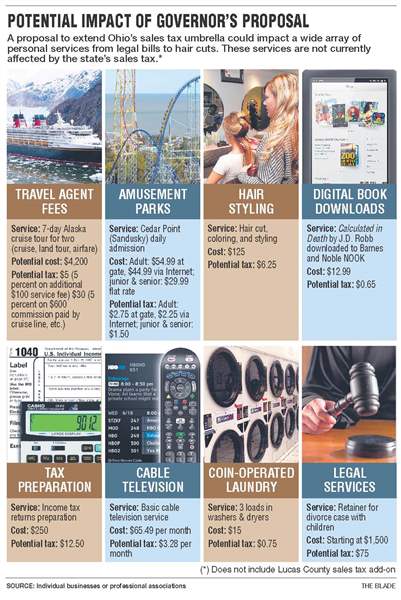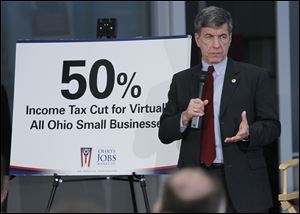
Ohioans wary of plan for sales tax expansion
Proposal takes aim at services
3/18/2013

Ohio Tax Commissioner Joe Testa says he understands that some of the proposed sales tax increases "are not small steps."
COLUMBUS — A woman spending $125 for a hair coloring, cut, and style may have to add $6.25 more to the bill before tip.
A $1,500 retainer to a lawyer to handle a divorce with child-custody issues may get $75 larger.
A proposal to extend Ohio’s sales-tax umbrella to cover a broad array of professional services could add to the cost of newly built homes as architects, engineers, and interior designers all find themselves collecting and remitting sales taxes for the first time in Ohio.
It will even cost more in taxes to pay your taxes.
While Gov. John Kasich argues that his plan more accurately reflects an economy that is increasingly service-based, targets of the tax counter that it will make some services less affordable for lower-income Ohioans and could work against the governor’s goal of adding small-business jobs to the economy.
Portions of the plan face opposition from both sides of the aisle. On Friday, House and Senate Republican leaders encouraged the public to offer their ideas for possible changes before the $63.3 billion, two-year budget reaches the governor’s desk by June 30.
“Change is hard,” Ohio Tax Commissioner Joe Testa said. “We recognize that. We’re taking some bold steps here. It’s taking some people a while to understand, or catch up, or go back to their desks and calculate what it means to them. … These are not small steps.”
The sales-tax expansion is just one component of a multifaceted tax-reform proposal the Republican governor promises will ultimately give a net $1.4 billion income-tax cut to individuals and small businesses over three years. The sales-tax base expansion would be coupled with a half-penny cut in the state’s share of the sales tax rate to 5 cents on the dollar.
Higher taxes on oil and natural gas extraction from growing horizontal-well drilling in eastern Ohio would be added to a net gain from the expanded sales-tax base to underwrite a 20 percent, across-all-brackets income-tax cut for individuals over three years and an immediate 50 percent break on the first $750,000 in profits made by small businesses.
Although the primary goal is to drive down the income tax, Mr. Testa said there are benefits to expanding the sales-tax base and reducing the state sales-tax rate. He said the same people who will pay a sales tax on professional services that weren’t previously taxed will benefit from the 0.5 percent cut in the rate they are already paying on goods.
“We are interested in driving down the income-tax rate in Ohio,” he said. “We believe that a state-income tax that isn’t competitive is a deterrent to economic growth. This is one area where Ohio stands out as too high.”

Travel fees
Chris Seddelmeyer, owner of Seddelmeyer Travel Concepts in Lima and president of the American Society of Travel Agents’ Mid-America Chapter, was in the crowd on Feb. 19 when Mr. Kasich delivered his State of the State address in her hometown.
She knows the expansion would target the service fees she charges her clients to put their vacation packages together.
“We do understand what the governor is trying to do as far as getting the state back on the right foot, and so far he has done a good job,” Ms. Seddelmeyer said. “But when you talk about a service industry, you’re hitting small business. These are what make your community thrive, the small mom-and-pop businesses with one to five employees.”
In addition to the service fees, travel agents fear the tax might be applied to the commissions they receive from cruise lines, hotels, tours, and others whose services they sell. On the day she talked to The Blade, she was putting together a seven-day Alaskan cruise for two that would cost $4,200.
The tax would add $5 to the $100 service fee she would charge and potentially $30 more on the $600 commission she’d receive from the tour business.
Travel agents note that most of the vacations they plan involve out-of-state travel and wonder whether Ohio would be able to collect the sales tax on services provided to Ohioans by Internet competition such as Expedia.
Cable increases
In 2003, Ohio extended the sales tax base to include satellite TV but not cable television, noting that cable was already paying a local-franchise fee. The courts later upheld that reasoning.
But Mr. Kasich’s plan would include cable TV under the sales tax umbrella this time. Consumers already pay the sales tax on cable-phone service and the cable boxes they rent. Internet service, however, is tax-exempt under federal law even when bundled with the other services.
Jonathon McGee, executive director of the Ohio Cable Telecommunications Association, said the argument that prevented sales taxation in 2003 should still apply a decade later. “The satellites do not pay the franchise fee,” he said. “Federal law pre-empts local governments from taxing satellites. There’s also the [county] piggyback tax. If the sales tax is put on cable products, cable customers will pay not only the 5 percent franchise tax but also the 5 percent [state] sales tax and the piggyback tax.”
He said taxation on cable television could reach 10 to 13 percent.
Basic expanded cable service for Buckeye CableSystem in Toledo costs $65.49 per month. A 5 percent state sales tax would add $3.28. Buckeye CableSystem is owned by Block Communications, Inc., parent company of The Blade.
Small business woes
Donna Kountouris, co-owner of Rainbow Laundry at 5825 Jackman Rd. in Toledo, questions whether she could pass the tax on to her customers. Some of her machines won’t take extra coins and, with the others, any increases would have to take place in increments of quarters.
On Thursday, a customer was washing and drying three loads of laundry for a total bill reaching about $15. The state-only sales tax of 5 percent would add 75 cents to the bill.
She said a sales-tax hike couldn’t come at a worse time.
“I had to take hours away from my employees,” she said. “I had to take the hours, or nobody was going to have a job. I’m the owner, but I’m an employee right now. The bills keep going up, but the money doesn’t. If anything else goes up, utilities or the minimum wage as I heard might happen, we’ll go under.”
Legal services
The Toledo Bar Association has yet to take a position on the governor’s proposal to tax legal services, but Sylvania attorney Mike Todak, bar president, plans to bring it up at the next meeting. Other such organizations, including the Ohio State Bar Association, argued that legal help should be considered an essential, tax-exempt service much as medical services are.
“If you have a criminal case, you need a defense,” Mr. Todak said. “That seems pretty essential. … We question why legal services are being treated differently than medical services when in most cases there can be the argument that they are essential services. There might be some cases where maybe they’re not, but where you draw the line becomes pretty difficult.”
Legal fees vary from lawyer to lawyer, but a 5 percent state sales tax on a simple will costing $200 would add $10 to the bill. If that will is drafted in Lucas County, add another 1 percent, the lower rate to which the county’s piggyback sales tax rate would be adjusted under Mr. Kasich’s plan. That would bring the tax to $12.
An estate-planning bill ranging from $500 to $2,000 would swell by anywhere from $25 to $100 or $30 to $120 more counting the Lucas County add-on.
Tax preparation
The expanded sales-tax base also would mean that you’ll pay more in taxes to pay your taxes if you use a professional tax-return preparer.
Robert K. Stavish, a certified public accountant in Bowling Green, is in the midst of tax-preparation season. He figures a typical homeowner filing returns coming to him could see an additional $12.50 in state-sales tax alone tacked onto the bill of $250. “A lot of these people are lower income and qualify for the earned-income tax credit, and this would add to the cost of the return,” he said.
Zach Schiller, research director at the left-leaning nonprofit Policy Matters Ohio, generally agrees with Mr. Kasich that expansion of the sales-tax base makes sense.
“If you broaden the sales tax, everybody is paying, so it’s not affecting only certain people,” he said. “But lower-income people spend nearly everything they make, which is the biggest reason why a sales-tax increase takes a bigger bite out of their income.”
He has suggested going forward with the sales-tax expansion but creating a variation on the federal-earned income tax credit to partly compensate lower-income Ohioans for their greater share of the burden percentagewise. The group, however, argues the broader income-tax cut would disproportionately benefit the wealthy.
Contact Jim Provance at: jprovance@theblade.com or 614-221-0496.